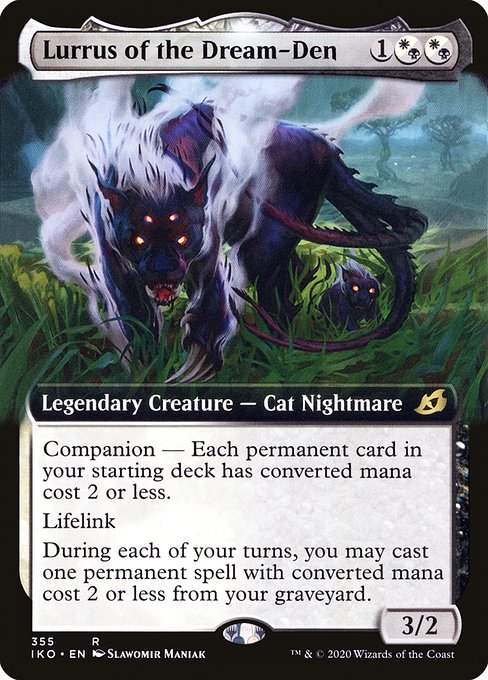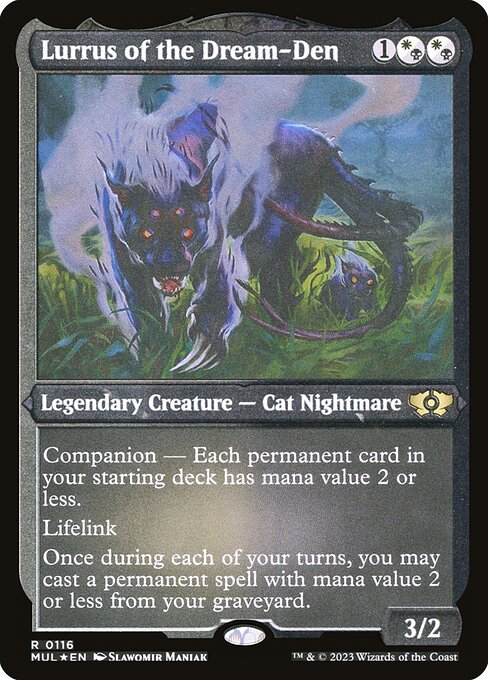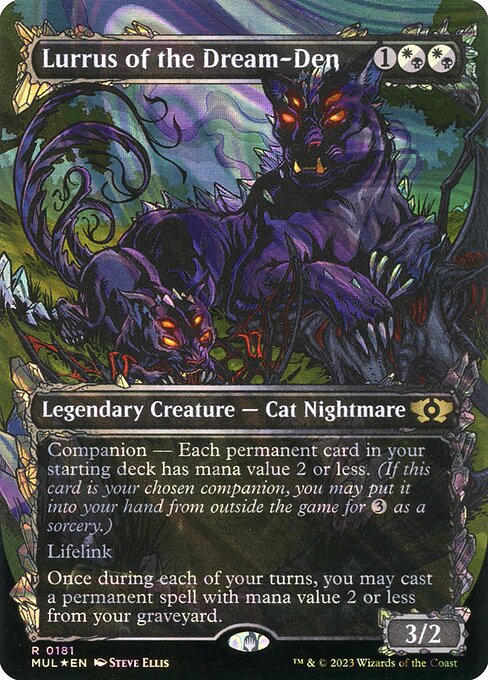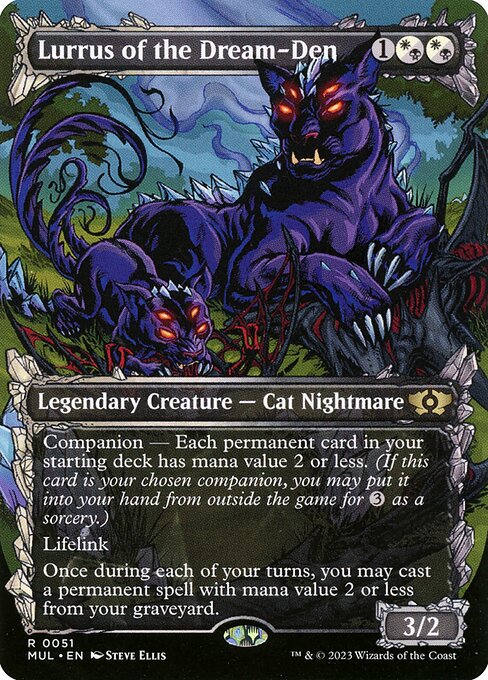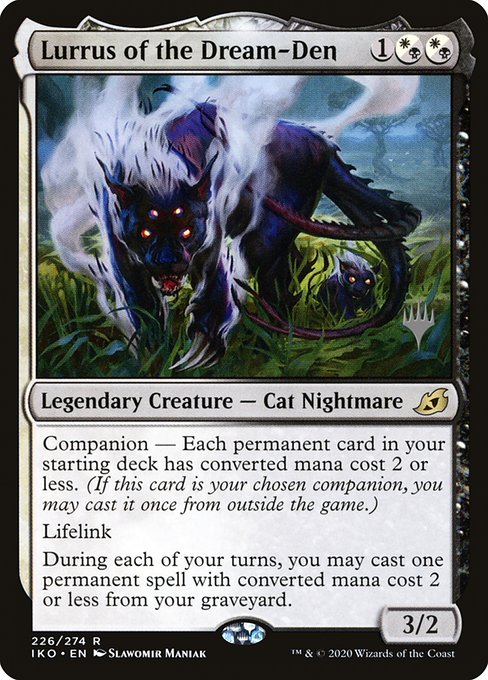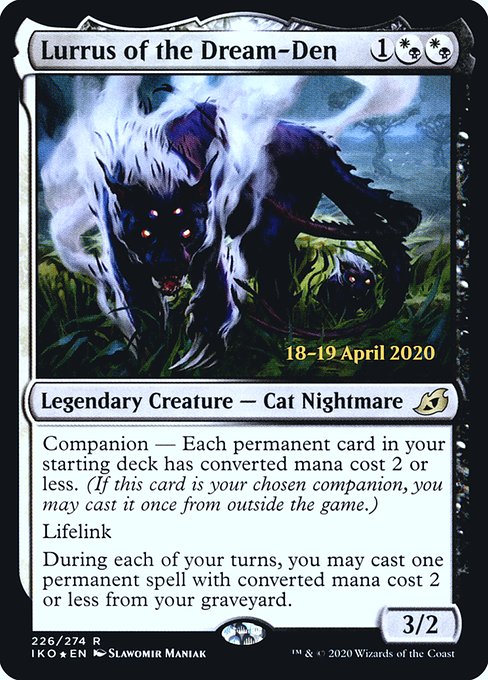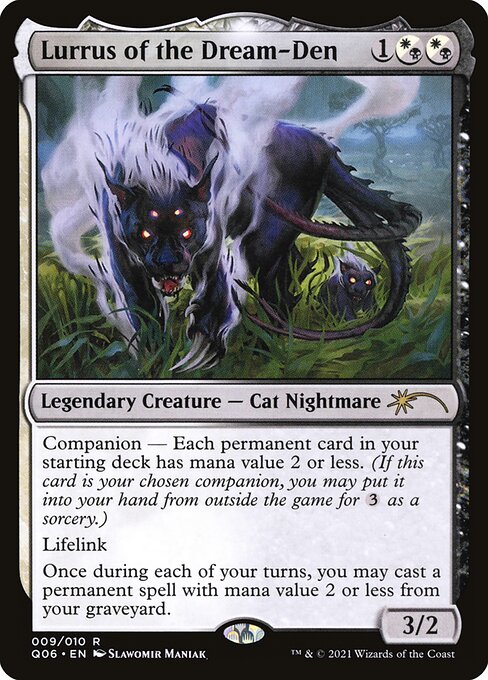Lurrus de la Tanière des rêves
Créature légendaire : chat et cauchemar
Compagnon — Chaque carte de permanent de votre deck de départ a un coût converti de mana inférieur ou égal à 2. (Si cette carte est le compagnon de votre choix, vous pouvez la lancer une fois depuis l'extérieur de la partie.)
Lien de vie
Pendant chacun de vos tours, vous pouvez lancer un sort de permanent avec un coût converti de mana inférieur ou égal à 2 depuis votre cimetière.
Lien de vie
Pendant chacun de vos tours, vous pouvez lancer un sort de permanent avec un coût converti de mana inférieur ou égal à 2 depuis votre cimetière.
3/2
standard
future
historic
gladiator
pauper
vintage
penny
commander
brawl
alchemy
paupercommander
duel
oldschool
premodern
Rulings
You must pay the costs to cast that spell. If it has an alternative cost, such as a mutate cost, you may cast it for that cost instead.
Once you begin to cast the spell, losing control of Lurrus won’t affect the spell. You can finish casting it as normal.
The companion’s other abilities apply only if the creature is on the battlefield. They have no effect while the companion is outside the game.
The companion ability has no effect if the card is in your starting deck and creates no restriction on putting a card with a companion ability into your starting deck. For example, Zirda may be in your starting deck even if your other permanent cards don’t all have activated abilities.
You may have one companion in the Commander variant. Your deck, including your commander, must meet its companion requirement. Your companion is not one of your one hundred cards.
Before shuffling your deck to become your library, you may reveal one card from outside the game to be your companion if your starting deck meets the requirements of the companion ability. You can’t reveal more than one. It remains revealed outside the game as the game begins.
The requirements of the companion ability apply only to your starting deck. They do not apply to your sideboard.
You must follow the normal timing permissions and restrictions of the spell you cast from your graveyard.
Lurrus doesn’t care about instant and sorcery cards in your starting deck. They may have any converted mana cost.
If you cast a spell from your graveyard using another permission, Lurrus’s effect doesn’t apply. You can cast another permanent spell from your graveyard.
If a card in a player’s deck has in its mana cost, X is considered to be 0.
If a permanent card is put into your graveyard during your main phase and the stack is empty, you have a chance to cast it before any player may attempt to remove that card from your graveyard.
Lurrus doesn’t let you play lands from your graveyard.
If more than one player wishes to reveal a companion, the starting player does so first, and players proceed in turn order. Once a player has chosen not to reveal a companion, that player can’t change their mind.
Your companion begins the game outside the game. In tournament play, this means your sideboard. In casual play, it’s simply a card you own that’s not in your starting deck.
For spells with in their mana costs, use the value chosen for X to determine the spell’s converted mana cost. For example, if a permanent spell costs , you could cast it with X as 1 but not as 2.
If you cast one permanent spell from your graveyard and then have a new Lurrus come under your control in the same turn, you may cast another permanent spell from your graveyard that turn.
Wizards of the Coast has issued functional errata for the Companion mechanic. Instead of casting companions from outside the game: Once per game, any time you could cast a sorcery (during your main phase when the stack is empty), you can pay to put your companion from your sideboard into your hand. This is a special action, not an activated ability. It happens immediately and can’t be responded to. It can’t be countered or stopped by cards like Phyrexian Revoker. For more information please see https://magic.wizards.com/en/articles/archive/news/june-1-2020-banned-and-restricted-announcement
Once you put your companion into your hand, it behaves like any other card you’ve brought into the game. For example, if it’s countered or destroyed, it’s put into your graveyard, remaining in the game.
Once you begin to cast the spell, losing control of Lurrus won’t affect the spell. You can finish casting it as normal.
The companion’s other abilities apply only if the creature is on the battlefield. They have no effect while the companion is outside the game.
The companion ability has no effect if the card is in your starting deck and creates no restriction on putting a card with a companion ability into your starting deck. For example, Zirda may be in your starting deck even if your other permanent cards don’t all have activated abilities.
You may have one companion in the Commander variant. Your deck, including your commander, must meet its companion requirement. Your companion is not one of your one hundred cards.
Before shuffling your deck to become your library, you may reveal one card from outside the game to be your companion if your starting deck meets the requirements of the companion ability. You can’t reveal more than one. It remains revealed outside the game as the game begins.
The requirements of the companion ability apply only to your starting deck. They do not apply to your sideboard.
You must follow the normal timing permissions and restrictions of the spell you cast from your graveyard.
Lurrus doesn’t care about instant and sorcery cards in your starting deck. They may have any converted mana cost.
If you cast a spell from your graveyard using another permission, Lurrus’s effect doesn’t apply. You can cast another permanent spell from your graveyard.
If a card in a player’s deck has in its mana cost, X is considered to be 0.
If a permanent card is put into your graveyard during your main phase and the stack is empty, you have a chance to cast it before any player may attempt to remove that card from your graveyard.
Lurrus doesn’t let you play lands from your graveyard.
If more than one player wishes to reveal a companion, the starting player does so first, and players proceed in turn order. Once a player has chosen not to reveal a companion, that player can’t change their mind.
Your companion begins the game outside the game. In tournament play, this means your sideboard. In casual play, it’s simply a card you own that’s not in your starting deck.
For spells with in their mana costs, use the value chosen for X to determine the spell’s converted mana cost. For example, if a permanent spell costs , you could cast it with X as 1 but not as 2.
If you cast one permanent spell from your graveyard and then have a new Lurrus come under your control in the same turn, you may cast another permanent spell from your graveyard that turn.
Wizards of the Coast has issued functional errata for the Companion mechanic. Instead of casting companions from outside the game: Once per game, any time you could cast a sorcery (during your main phase when the stack is empty), you can pay to put your companion from your sideboard into your hand. This is a special action, not an activated ability. It happens immediately and can’t be responded to. It can’t be countered or stopped by cards like Phyrexian Revoker. For more information please see https://magic.wizards.com/en/articles/archive/news/june-1-2020-banned-and-restricted-announcement
Once you put your companion into your hand, it behaves like any other card you’ve brought into the game. For example, if it’s countered or destroyed, it’s put into your graveyard, remaining in the game.
Rulings
You must pay the costs to cast that spell. If it has an alternative cost, such as a mutate cost, you may cast it for that cost instead.
Once you begin to cast the spell, losing control of Lurrus won’t affect the spell. You can finish casting it as normal.
The companion’s other abilities apply only if the creature is on the battlefield. They have no effect while the companion is outside the game.
The companion ability has no effect if the card is in your starting deck and creates no restriction on putting a card with a companion ability into your starting deck. For example, Zirda may be in your starting deck even if your other permanent cards don’t all have activated abilities.
You may have one companion in the Commander variant. Your deck, including your commander, must meet its companion requirement. Your companion is not one of your one hundred cards.
Before shuffling your deck to become your library, you may reveal one card from outside the game to be your companion if your starting deck meets the requirements of the companion ability. You can’t reveal more than one. It remains revealed outside the game as the game begins.
The requirements of the companion ability apply only to your starting deck. They do not apply to your sideboard.
You must follow the normal timing permissions and restrictions of the spell you cast from your graveyard.
Lurrus doesn’t care about instant and sorcery cards in your starting deck. They may have any converted mana cost.
If you cast a spell from your graveyard using another permission, Lurrus’s effect doesn’t apply. You can cast another permanent spell from your graveyard.
If a card in a player’s deck has in its mana cost, X is considered to be 0.
If a permanent card is put into your graveyard during your main phase and the stack is empty, you have a chance to cast it before any player may attempt to remove that card from your graveyard.
Lurrus doesn’t let you play lands from your graveyard.
If more than one player wishes to reveal a companion, the starting player does so first, and players proceed in turn order. Once a player has chosen not to reveal a companion, that player can’t change their mind.
Your companion begins the game outside the game. In tournament play, this means your sideboard. In casual play, it’s simply a card you own that’s not in your starting deck.
For spells with in their mana costs, use the value chosen for X to determine the spell’s converted mana cost. For example, if a permanent spell costs , you could cast it with X as 1 but not as 2.
If you cast one permanent spell from your graveyard and then have a new Lurrus come under your control in the same turn, you may cast another permanent spell from your graveyard that turn.
Wizards of the Coast has issued functional errata for the Companion mechanic. Instead of casting companions from outside the game: Once per game, any time you could cast a sorcery (during your main phase when the stack is empty), you can pay to put your companion from your sideboard into your hand. This is a special action, not an activated ability. It happens immediately and can’t be responded to. It can’t be countered or stopped by cards like Phyrexian Revoker. For more information please see https://magic.wizards.com/en/articles/archive/news/june-1-2020-banned-and-restricted-announcement
Once you put your companion into your hand, it behaves like any other card you’ve brought into the game. For example, if it’s countered or destroyed, it’s put into your graveyard, remaining in the game.
Once you begin to cast the spell, losing control of Lurrus won’t affect the spell. You can finish casting it as normal.
The companion’s other abilities apply only if the creature is on the battlefield. They have no effect while the companion is outside the game.
The companion ability has no effect if the card is in your starting deck and creates no restriction on putting a card with a companion ability into your starting deck. For example, Zirda may be in your starting deck even if your other permanent cards don’t all have activated abilities.
You may have one companion in the Commander variant. Your deck, including your commander, must meet its companion requirement. Your companion is not one of your one hundred cards.
Before shuffling your deck to become your library, you may reveal one card from outside the game to be your companion if your starting deck meets the requirements of the companion ability. You can’t reveal more than one. It remains revealed outside the game as the game begins.
The requirements of the companion ability apply only to your starting deck. They do not apply to your sideboard.
You must follow the normal timing permissions and restrictions of the spell you cast from your graveyard.
Lurrus doesn’t care about instant and sorcery cards in your starting deck. They may have any converted mana cost.
If you cast a spell from your graveyard using another permission, Lurrus’s effect doesn’t apply. You can cast another permanent spell from your graveyard.
If a card in a player’s deck has in its mana cost, X is considered to be 0.
If a permanent card is put into your graveyard during your main phase and the stack is empty, you have a chance to cast it before any player may attempt to remove that card from your graveyard.
Lurrus doesn’t let you play lands from your graveyard.
If more than one player wishes to reveal a companion, the starting player does so first, and players proceed in turn order. Once a player has chosen not to reveal a companion, that player can’t change their mind.
Your companion begins the game outside the game. In tournament play, this means your sideboard. In casual play, it’s simply a card you own that’s not in your starting deck.
For spells with in their mana costs, use the value chosen for X to determine the spell’s converted mana cost. For example, if a permanent spell costs , you could cast it with X as 1 but not as 2.
If you cast one permanent spell from your graveyard and then have a new Lurrus come under your control in the same turn, you may cast another permanent spell from your graveyard that turn.
Wizards of the Coast has issued functional errata for the Companion mechanic. Instead of casting companions from outside the game: Once per game, any time you could cast a sorcery (during your main phase when the stack is empty), you can pay to put your companion from your sideboard into your hand. This is a special action, not an activated ability. It happens immediately and can’t be responded to. It can’t be countered or stopped by cards like Phyrexian Revoker. For more information please see https://magic.wizards.com/en/articles/archive/news/june-1-2020-banned-and-restricted-announcement
Once you put your companion into your hand, it behaves like any other card you’ve brought into the game. For example, if it’s countered or destroyed, it’s put into your graveyard, remaining in the game.
Votre collection ? vos decks ?
Envie de gérer votre collection et/ou créer des decks ?
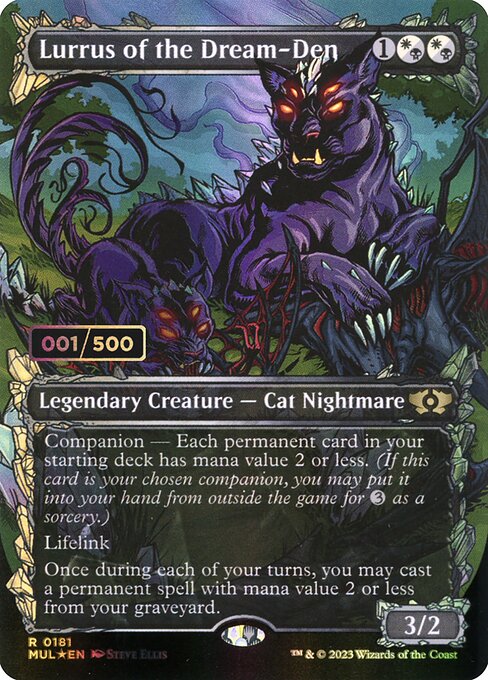

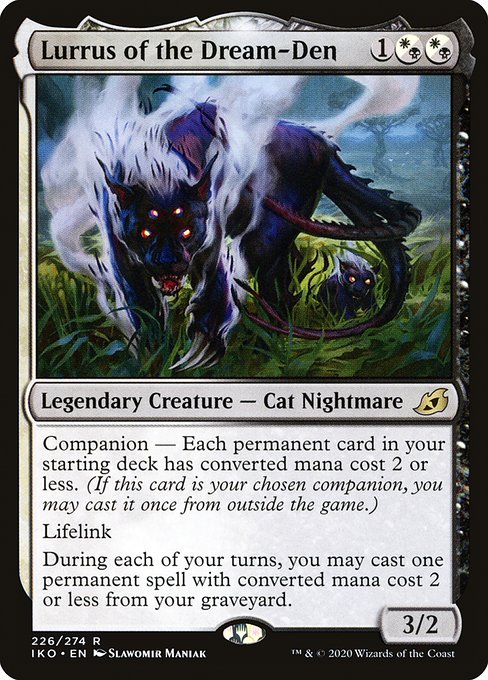
 0
0
 1.29€
1.29€
